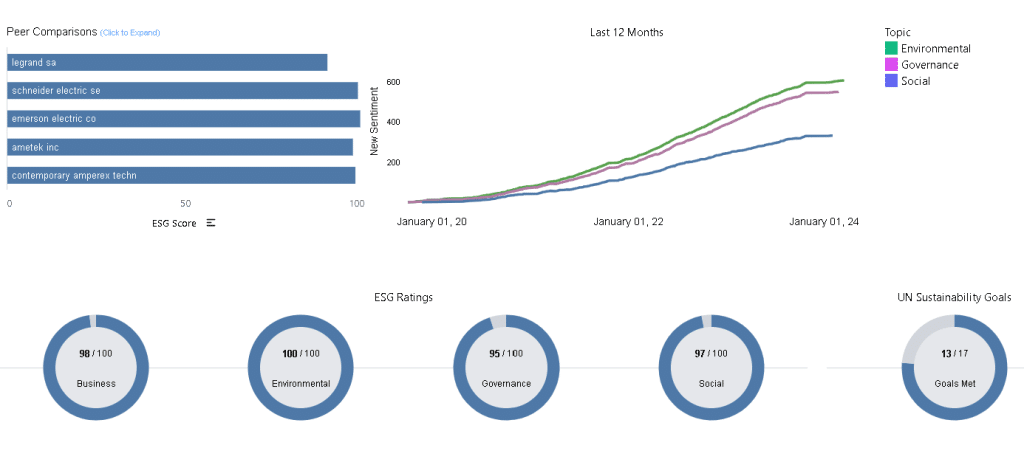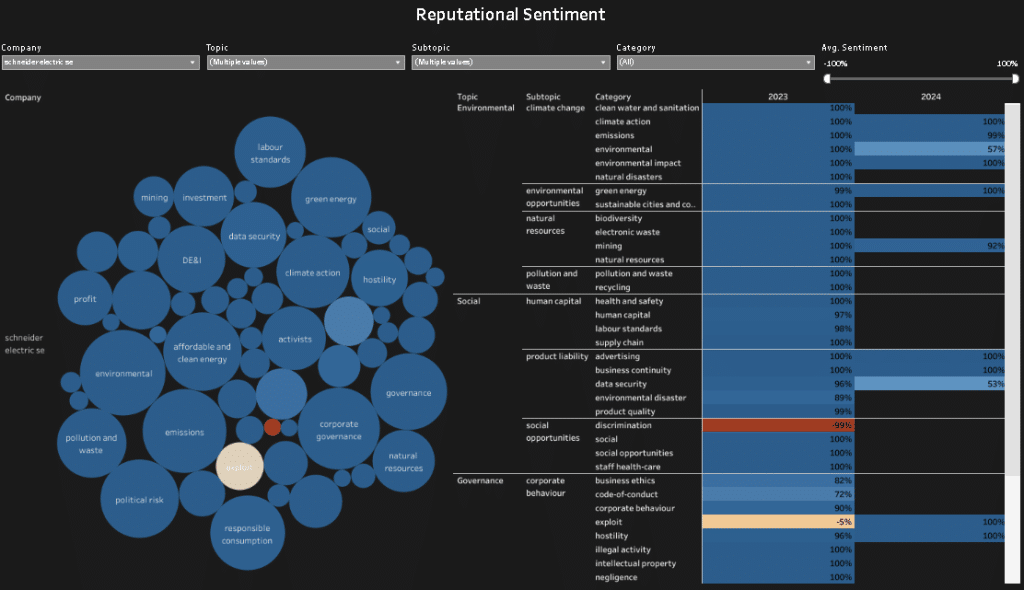Schneider Electric, the global leader in energy management and automation, has long been at the forefront of sustainability initiatives. With a firm belief in the importance of environmental, social, and governance (ESG) responsibility, Schneider Electric has committed itself to develop innovative solutions that contribute to a more sustainable future. In this article, we will take a closer look at Schneider Electric’s ESG initiatives and their impact on the industry.
Understanding our Schneider Electric ESG score
Understanding our Schneider Electric ESG score provides a comprehensive insight into the company’s performance across three critical dimensions of sustainability: environmental, social, and governance. According to our advanced analytics, which leverages news sentiment analysis, Schneider Electric has achieved remarkable scores in each category: 100 in environmental, 97 in social, and 95 in governance. These scores are not just numbers but reflect Schneider Electric’s steadfast commitment and industry-leading efforts in integrating sustainability into its core operations. It is plain to see from these scores that Schneider Electric has recognized the significance of ESG and has integrated these principles into its business strategy. Now let’s take a closer look at the activities behind each pillar of our Schneider Electric ESG score.


Schneider Electric’s environmental sustainability efforts
Schneider Electric is dedicated to minimizing its environmental footprint and creating sustainable solutions. The company has set ambitious targets to reduce its greenhouse gas emissions, energy consumption, and water usage. Through innovative technologies and practices, Schneider Electric aims to help its customers achieve energy efficiency and reduce carbon emissions. By leveraging digital solutions and renewable energy sources, the company is driving the transition towards a low-carbon economy.
Schneider Electric’s EcoStruxure software aids businesses in optimizing energy usage across buildings, data centres, and industrial operations. Their commitment to innovation has led to partnerships with customers that have collectively saved 302 million tons of CO2 emissions since 2018. As part of their ambitious sustainability agenda, Schneider Electric has launched the “Zero Carbon Project,” targeting a 50% reduction in carbon emissions from their top suppliers by 2025. This initiative is a key component of their broader strategy to minimize their environmental footprint and achieve carbon neutrality by 2025, with a longer-term goal of reaching net-zero emissions by 2050.
Schneider Electric’s commitment to environmental sustainability also extends to its product lifecycle. The company focuses on eco-design and circular economy principles, ensuring that its products are energy-efficient, recyclable, and contribute to a more sustainable future. Schneider Electric also actively promotes the use of renewable energy sources, such as solar and wind power, to reduce reliance on fossil fuels.
In addition to these technical and operational efforts, Schneider Electric places a strong emphasis on transparency and fostering a collaborative work culture. They encourage their employees to actively participate in sustainability efforts through a “Speak Up” culture that promotes ethical conduct. The company has established a Sustainability School, aiming to educate its workforce on climate issues and empower them to contribute positively to the environment. Through these comprehensive approaches, Schneider Electric not only enhances its operational sustainability but also invests in building a knowledgeable and ethically driven team committed to environmental stewardship.
Social initiatives and community engagement by Schneider Electric
Schneider Electric recognizes that its success is intertwined with the well-being of the communities it operates in. The company is committed to creating positive social impact through various initiatives. Schneider Electric’s Access to Energy program aims to provide electricity to underserved communities around the world, enabling economic development and improving quality of life. Through partnerships with local organizations and governments, Schneider Electric has already brought electricity to millions of people in remote areas.
In addition to its Access to Energy program, Schneider Electric actively promotes diversity and inclusion within its workforce. The company believes that a diverse and inclusive workforce fosters creativity, innovation, and better decision-making. Schneider Electric also encourages its employees to engage in volunteer activities, empowering them to make a difference in their local communities.
Governance and ethical practices at Schneider Electric
Schneider Electric places a strong emphasis on governance and ethical practices. The company has implemented strict codes of conduct and compliance policies to ensure transparency, integrity, and accountability in its operations. Schneider Electric’s Board of Directors oversees the company’s governance framework and ensures that it aligns with global best practices.
In addition, Schneider Electric actively engages with its stakeholders, including shareholders, customers, employees, and communities, to ensure that their voices are heard and their interests are considered. The company’s commitment to good governance and ethical practices is essential in maintaining trust and building long-term relationships with its stakeholders.
The impact of Schneider Electric’s ESG initiatives
Schneider Electric’s ESG initiatives have had a significant impact on the industry. By prioritizing sustainability and integrating ESG principles into its business strategy, Schneider Electric has become a leader in the energy management and automation sector. The company’s innovative solutions and commitment to environmental stewardship have not only reduced its own environmental footprint but have also inspired other organizations to follow suit.
Schneider Electric’s social initiatives, such as the Access to Energy program, have made a tangible difference in the lives of millions of people. By providing electricity to underserved communities, Schneider Electric is empowering economic development and improving access to education, healthcare, and other essential services.
Schneider Electric peer comparison
Schneider Electric’s commitment to sustainability is robust and clearly articulated through its ambitious goals, such as achieving carbon neutrality by 2025 and net-zero emissions by 2050. This places Schneider Electric at the forefront of the industry in terms of sustainability targets. Compared to its main competitors like Siemens AG, ABB Ltd, Eaton Corporation, and others, Schneider Electric’s initiatives, particularly its Zero Carbon Project and comprehensive energy management solutions, showcase a deep integration of sustainability into its core business strategy.
While Siemens and ABB also have strong sustainability agendas, focusing on renewable energy and reducing greenhouse gas emissions, Schneider Electric differentiates itself through a wide-ranging approach that includes not only environmental sustainability but also significant investments in social and governance aspects. Its efforts to reduce the carbon footprint across its value chain, combined with transparency and employee engagement in sustainability practices, underscore a holistic approach that may offer a competitive edge.
Each competitor, including Honeywell, Johnson Controls, and Mitsubishi Electric, brings its strengths to sustainability efforts, but Schneider Electric’s clear targets, innovative solutions like EcoStruxure, and educational initiatives like the Sustainability School demonstrate a comprehensive and actionable commitment to environmental stewardship and social responsibility. See our ESG reports for Schneider Electric’s competitors below.
– Rockwell Automation ESG score
– Mitsubishi Electric ESG score
Schneider Electric’s leadership in ESG and its impact on the industry
Schneider Electric’s commitment to sustainability and its comprehensive ESG initiatives have positioned the company as a global leader in energy management and automation. By prioritizing environmental, social, and governance responsibility, Schneider Electric has not only reduced its own environmental footprint but has also made a positive impact on the industry and the communities it serves.
Through its environmental sustainability efforts, social initiatives, and ethical practices, Schneider Electric has set a benchmark for other organizations to follow. The company’s partnerships and collaborations for sustainable development further demonstrate its commitment to driving positive change.
As Schneider Electric continues to innovate and lead in the ESG space, it is inspiring others to embrace sustainability and contribute to a more sustainable and inclusive future. With its clear goals, transparent reporting, and commitment to ongoing improvement, Schneider Electric is paving the way for a greener and more sustainable world.
Scheider Electric ESG score final thoughts
Schneider Electric’s robust ESG score underlines its leadership role in integrating sustainability across the environmental, social, and governance spectrums. Schneider Electric sets a high benchmark, not just in terms of ambitious targets like achieving carbon neutrality by 2025 and net-zero emissions by 2050 but also in the depth and breadth of its initiatives. Compared to industry peers like Siemens AG, ABB Ltd, Eaton Corporation, and others, Schneider Electric distinguishes itself with a comprehensive approach that seamlessly blends innovative solutions, such as its EcoStruxure platform and the Zero Carbon Project, with significant investments in its people and ethical practices.
This strategic focus on sustainability has not only enabled Schneider Electric to reduce its environmental footprint significantly but also to drive industry-wide change by inspiring other organizations to follow suit. With its impressive ESG score, Schneider Electric demonstrates the tangible benefits of embedding sustainability into the core business strategy—benefits that extend beyond the company to positively impact the global community and environment. As the world grapples with the urgent need for sustainable development, Schneider Electric’s continued commitment and progress in ESG practices serve as a model for corporate responsibility and environmental stewardship in the 21st century.
